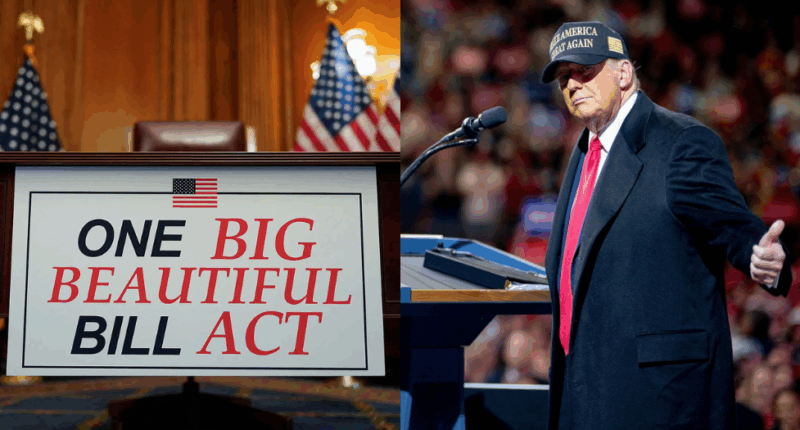
 U.S. President Donald Trump’s major budget bill narrowly passed the U.S. Congress on Jul. 3, AP News reported.
U.S. President Donald Trump’s major budget bill narrowly passed the U.S. Congress on Jul. 3, AP News reported.
The bill, nicknamed ‘Big, Beautiful Bill’, was passed by just four votes in the House of Representatives in a 218-214 outcome, a day before its Jul. 4 deadline.
With its passing, the Bill is expected to be signed into law by Trump on Jul. 4, the U.S.’s Independence Day.
What’s in the bill?
The nearly 900-page bill consists of a number of widely-contested policies, including healthcare spending cuts and border security funding.
Here are some of the key issues in summary.
Tax breaks for the wealthy
The bill makes permanent the Trump tax cuts that were passed on a temporary basis during his first term, back in 2017.
The Senate version of the bill will also see, in dollar terms, millionaire earners receiving an average after-tax income increase of US$75,000 (S$95,500) in 2026, CNBC reported.
Medicaid cuts
The bill includes additional restrictions and requirements to qualify for Medicaid, the healthcare programme some 71 million disabled and low-income Americans rely on, says AP News.
Childless adults without disabilities would be required to work at least 80 hours per month from December 2026 to qualify for Medicaid.
Beneficiaries may also be made to pay a US$35 (S$45) co-payment to rely on the assistance programme.
According to BBC, nearly 12 million Americans may become uninsured by 2034 due to the changes.
Clean energy tax incentives cuts
The bill will also slash existing tax breaks that were designed to encourage energy and wind-fuelled clean energy projects.
Currently, people who buy new or used electric vehicles enjoy a tax break that would expire at the end of 2032.
This expiry date will now be changed to Sep. 30, 2025.
At the same time, a tax credit will be implemented for the production of metallurgical coal, used for steelmaking.
Border security package
US$350 billion (S$445.8 billion) will be provided for Trump’s national security policies, signalling another step in his protectionist agenda.
Allocations for the spending include extending the U.S.-Mexico border wall, providing 100,000 migrant detention facility beds and hiring 10,000 new Immigration and Customs Enforcement (ICE) officers.
Asylum seekers to the U.S will also face new fees, including US$1,000 (S$1,274) in application, US$550 (S$700) for employment and US$500 (S$637) for a temporary protected status.
Applications for asylum was previously free in the U.S.
The changes will fuel Trump’s promise of the largest mass deportation of immigrants in U.S.’s history, according to AP News.
Long-drawn victory for Trump
The passing of the bill represents the first major victory for Trump six months into his second term of presidency, CNN said.
Its passage faced a series of setbacks, especially in light of an increasingly divided Republican party.
The bill was narrowly passed by the Senate on Jul. 1 by a single tie-breaking vote, which was cast by U.S. Vice-President JD Vance.
All Democratic senators in the Senate voted against the bill, and were joined by three Republicans, BBC reported.
Even among the Republicans who voted for the bill, not all were readily supportive.
Alaska Senator Lisa Murkowski had reportedly withheld her vote over concerns of the Medicaid cuts, and was the final Republican to vote in favour.
The vote in the U.S. House of Representatives on Jul. 3, the final step for the bill to be passed by Congress, was just as contentious.
House members were made to pull all-nighters as the vote ran overnight to meet the Jul. 4 deadline, Reuters reported.
Democratic Minority Leader of the House Hakeem Jeffries attempted a last-ditched effort to stall for time, delivering a nearly nine-hour long speech to denounce the bill.
“This assault on everyday Americans, assault on children, veterans, seniors, people with disabilities. It’s incredible to me, all of this in this one, big, ugly bill”, he said, according to The Guardian.
Leading up to the vote, Republican leaders reportedly made last-ditch efforts to convince House Republicans to “fall in line” behind Trump by flipping “no” votes.
It paid off, CNN said, as the final results saw only two Republicans vote against the bill.
While calling Trump an “omnipresent force” behind the passage, The White House has insisted that Trump did not “threaten to primary” any members of Congress to vote in favour of his bill.
A number of centrist-Republicans who had long criticised the US$3.3 trillion added deficit due to the bill were also eventually swayed, according to The Guardian.
Reactions
The bill’s passing in Congress drew a mix of reactions among key political figures.
Celebrations
Shortly before leaving for Iowa for celebrations marking the U.S.’s 250th birthday, Trump told reporters that the bill would “turn this country into a rocket ship”, BBC said.
“There could be no better birthday present for America than the phenomenal victory we achieved just hours ago when Congress passed the ‘one big, beautiful bill’ to ‘Make America Great Again’,” he said upon his arrival in Iowa according to CNN.
On the lack of Democrat votes for the bill, he added, “Not one Democrat voted for us, and I think we use it in the campaign that’s coming up the midterms, because we got to beat them”.
“Of the all of the things that we’ve given and they wouldn’t vote only because they hate Trump, but I hate them too, you know?”
Vance, meanwhile, admitted on X that he was skeptical at times that the bill would pass by Jul. 4.
“But now we’ve delivered big tax cuts and the resources necessary to secure the border. Promises made, promises kept!” he wrote.
Criticisms
Democratic politicians have also weighed in on the bill’s passage.
In a post on X, former U.S. President Joe Biden called the bill “not only reckless – it’s cruel”.
Highlighting how specific elements of the bill would negatively affect Americans, he added, “All of this to give a massive tax break to billionaires. Working people deserve better.”
Like Jeffries, former Speaker of the House Nancy Pelosi called the bill “The Republicans’ Big, Ugly Bill”.
“This bill is a betrayal that abandons the needs of hardworking Americans and balloons the national debt by over $4 trillion — not to invest in the future, but to reward the wealthiest in our country at the expense of everyone else”, she said.
Kentucky representative Thomas Massie, one of the two House Republicans who voted against the bill, told reporters, it “wasn’t beautiful enough for me to vote for it”.
The other defector, Pennsylvania’s representative Brian Fitzpatrick, told reporters that the Senate’s Medicaid cuts to an earlier version of the bill was what changed his final vote.
He had earlier voted in favour of the bill, before it went to the Senate.
“I voted to strengthen Medicaid protections, to permanently extend middle-class tax cuts, for enhanced small business tax relief and for historic investments in our border security and our military”, he said.
Top images via Center for American Progress & Donald J. Trump/Facebook








